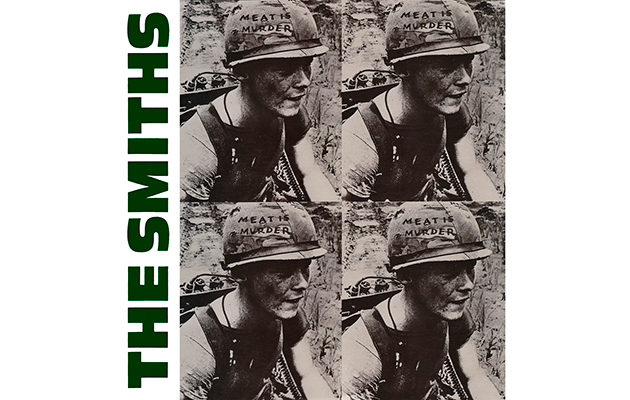With the imminent release of Morrissey's debut novel, List Of The Lost, now seems like a good time to post my Smiths' Meat Is Murder cover story from the February 2015 issue of Uncut... Follow me on Twitter @MichaelBonner -------- The Pleasures Of The Flesh If their first album set out the emot...
Stephen Street remembers the first time he became aware of The Smiths. “I saw them on Top Of The Pops, performing ‘This Charming Man’,” he says. “I was working at Island as an in-house engineer. There was a session booked for the weekend, so they wanted someone who was prepared to come in. Once I heard it was The Smiths, I said, ‘I’d definitely like to do that.’ You could tell the band were excited. They were very together, they’d done a lot of touring so they were in good shape… really hot.”
Street’s session – in March 1984 for “Heaven Knows I’m Miserable Now” – marked the start of a long and fruitful relationship with the band. A few months later, Street received a phone call from Rough Trade’s Geoff Travis. “He said the band want to do a record where they want to produce it themselves, and they want to work with an engineer they like and trust – would I be up for it? So we started sessions at Amazon. You could tell that the feeling in the band was very positive. They knew they were onto something good. Everything was flying. We would get picked up at 9.30 – 10 o’clock in the morning in Manchester. Get to Amazon at about 11, work through to about eight o’clock at night, perhaps nine, and then get driven back.”
“We figured, why have a producer and have his opinion forced upon us when we can do it perfectly well ourselves?” explains Andy Rourke. “It was a control thing. We really liked Stephen.”
“I was literally the same age as Morrissey,” says Street. “I’m in the same age group as the band. Morrissey was the eldest, then it was me. So it was a bunch of guys together. We were experimenting.”
“I was exploring what I could do,” Johnny Marr told Uncut in 2008. “I suppose I was feeling let loose on that second record. The first period was over – of getting known, learning to play onstage, getting a label and getting a relationship with the audience and then that’s worked out. And then I went into it just rolling my sleeves up and thinking, ‘Let’s see what we can do!’”
“I get the impression that they were pretty well prepared for it – more so than the later albums we made together,” acknowledges Street. “They had a bit of time playing these songs in rehearsals or in soundchecks. ‘Barbarism Begins At Home’ goes back quite a long way.”
“We had about 80 per cent of the songs in hand,” remembers Andy Rourke. “We always worked in the same way. Johnny, myself and Mike would put down a rough track with Johnny playing live guitar, just so we had that as a reference. We’d go all the way back and Mike would lay down the drums proper, listening to Johnny’s guitar, and then I’d put the bass on top. Then Johnny would layer all his guitars. Lastly, Morrissey would do his magic over the top.”
For the most part, Rourke reveals, Morrissey would be in the studio with the rest of the band even when he wasn’t specifically required for the recording. “Then he would come into the recording room, with his notebook and his lyrics. He wouldn’t show them to anybody beforehand. That was always an exciting part! You’d hear the lyrics for the first time when he was singing them over the track.”
Writing glowingly of the sessions in Autobiography, Morrissey recalls, “We thrashed through the new songs back to back in order to see – just for the hell of it – where everything would land… Out poured the signature Smiths powerhouse full-tilt.” Among the songs recorded at Amazon between October and November, 1984, Morrissey described “The Headmaster Ritual” as “a live-wire spitfire guitar sound that takes on all-comers; bass domination instant on ‘Rusholme Ruffians’; weightier drums on ‘I Want The One I Can’t Have’. The Smiths began to stand upright.”
Rourke, for his part, describes the sessions as “really fun to record”, while Street professes to have been “blown away when I first heard ‘The Headmaster Ritual’. I thought this was fantastic, and when I heard the lyrics as well, I thought it just sounded so… Morrissey! It was stunning.”
“The Headmaster Ritual”, the album’s opening track, set out the band’s stall. Inspired by Morrissey’s own unhappy schooldays at St Mary’s Secondary, Stretford, the song’s fury was directed at violent beatings dished out by the teachers – “belligerent ghouls” – leaving terrified pupils with “bruises bigger than dinner plates”. “Barbarism Begins At Home”, meanwhile, addressed domestic mistreatment: “Unruly boys” and “unruly girls”, Morrissey sang, “They must be taken in hand” – a queasy, ambiguous phrase that implied both harsh corrective discipline and also sexual abuse. Morrissey repeats the line “a crack on the head” eight times during the song’s duration, at one point yelping as if in pain himself. “Rusholme Ruffians”, meanwhile, described stabbings and a potential suicide attempt. The songs they recorded were brimming with violence, but also yearning (“I want the one I can’t have”), romance (“My faith in love is still devout”) and the melodrama of youth (“This is the final stand of all I am”).



